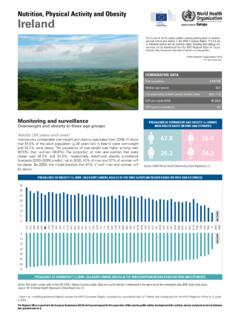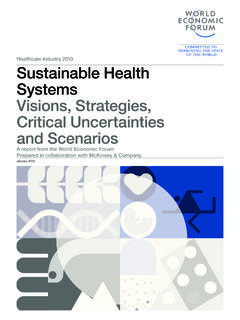Transcription of Assessing chronic disease management in European health ...
1 ISBN 92890503029789289050302 The rising burden of chronic illness, in particular the rapid increase in the number of people withmultiple health problems, is a challenge to health systems globally. Associated premature mortalityand reduced physical functioning, along with higher use of health services and related costs, areamong the key concerns faced by policy-makers and is a clear need to redesign delivery systems in order to better meet the needs created bychronic conditions, moving from the traditional, acute and episodic model of care to one that bettercoordinates professionals and institutions and actively engages service users and their countries have begun this process but it has been difficult to reach conclusions about thebest approach to take: care models are highly context-dependent and scientifically rigorous evaluations have been chronic disease management in European health systemsexplores some of the key issues, ranging from interpreting the evidence base to Assessing the policy context for, and approaches to, chronic disease management across Europe.
2 Drawing on 12 detailed country reports(available in a second, online volume), the study provides insights into the range of care modelsand the people involved in delivering these; payment mechanisms and service user access; andchallenges faced by countries in the implementation and evaluation of these novel book builds on the findings of the DISMEVAL project (Developing and validating disease management EVAL uation methods for European health care systems), led by RAND Europe andfunded under the European Union s (EU) Seventh Framework Programme (FP7) (Agreement no. 223277).The editorsEllen Nolte, Hub Cordinator, European Observatory on health Systems and cile Knai, Senior Lecturer, London School of Hygiene & Tropical B. Saltman, Professor of health Policy and management at the Rollins School of PublicHealth of Emory University in Atlanta and Associate Head of Research Policy at the EuropeanObservatory on health Systems and Studies Series No.
3 3737 Observatory Studies Series37 Edited by Ellen Nolte, C cile Knai, Richard B SaltmanASSESSING chronic disease management IN European health SYSTEMSC oncepts and approachesAssessing chronic disease management in European health systemsEdited byEllen NolteC cile KnaiRichard B. SaltmanCover_WHO_nr37_bis_Mise en page 1 5/02/15 15:39 Page 1 Assessing chronic disease management in European health systemsThe European Observatory on health Systems and Policies supports and promotes evidence-based health policy-making through comprehensive and rigorous analysis of health systems in Europe. It brings together a wide range of policy-makers, academics and practitioners to analyse trends in health reform, drawing on experience from across Europe to illuminate policy European Observatory on health Systems and Policies is a partnership, hosted by the WHO Regional Office for Europe, which includes the Governments of Austria, Belgium, Finland, Ireland, Norway, Slovenia, Sweden, the United Kingdom and the Veneto Region of Italy; the European Commission; the World Bank; UNCAM (French National Union of health Insurance Funds); the London School of Economics and Political Science.
4 And the London School of Hygiene & Tropical chronic disease management in European health systemsConcepts and approachesEdited byEllen NolteC cile KnaiRichard B. Saltmanon health Systems and PoliciesEuropeana partnership hosted by WHOivAssessing chronic disease management in European health systemsKeywords: chronic DISEASEDELIVERY OF health CARE, INTEGRATEDHEALTH CARE SYSTEMSHEALTH POLICYPUBLIC health World health Organization 2014 (acting as the host organization for, and secretariat of, the European Observatory on health Systems and Policies)All rights reserved. The European Observatory on health Systems and Policies welcomes requests for permission to reproduce or translate its publications, in part or in designations employed and the presentation of the material in this publication do not imply the expression of any opinion whatsoever on the part of the European Observatory on health Systems and Policies concerning the legal status of any country, territory, city or area or of its authorities, or concerning the delimitation of its frontiers or boundaries.
5 Dotted lines on maps represent approximate border lines for which there may not yet be full mention of specific companies or of certain manufacturers products does not imply that they are endorsed or recommended by the European Observatory on health Systems and Policies in preference to others of a similar nature that are not mentioned. Errors and omissions excepted, the names of proprietary products are distinguished by initial capital reasonable precautions have been taken by the European Observatory on health Systems and Policies to verify the information contained in this publication. However, the published material is being distributed without warranty of any kind, either express or implied. The responsibility for the interpretation and use of the material lies with the reader.
6 In no event shall the European Observatory on health Systems and Policies be liable for damages arising from its use. The views expressed by authors, editors, or expert groups do not necessarily represent the decisions or the stated policy of the European Observatory on health Systems and Policies or any of its 978 92 890 5030 2 Printed in the United KingdomCover design by M2 MAddress requests about publications to: Publications, WHO Regional Office for Europe, UN City, Marmorvej 51, DK-2100 Copenhagen , , complete an online request form for documentation, health information, or for permission to quote or translate, on the Regional Office web site ( ).ContentsPreface viiAcknowledgement ixList of tables and boxes xiList of abbreviations xiiiVolume I contributors xv1 Introduction 1 Background 1 Approach to this book 3 Conceptualizing chronic disease and chronic disease management 4 Countries included in the review 7 About this book 72 What we know: a brief review of the evidence of approaches to chronic care 9 Managing care for people with chronic conditions: concepts and definitions 9 disease management 10 Integrated care 11 What we do know.
7 A review of the evidence base on approaches to caring for people with chronic conditions 12 disease management 12 Integrated care 15 Economic impacts of disease management or integrated care 18 What we need to know: limitations of the existing evidence base 19 Conclusions 213 Approaches to chronic disease management in Europe 23 Key features of the health care systems in 12 European countries 23 The policy context for chronic care in Europe 25 Overview of approaches to chronic disease management in 12 European countries 30 Financing, distribution and uptake of approaches to chronic disease management 42 Components of chronic disease management 55 Conclusions 70 The majority of approaches tend to focus on populations with defined conditions 70viAssessing chronic disease management in European health systems There is a trend towards strengthening the role of nurses in care delivery and coordination 71 Approaches that seek to reduce barriers between sectors remain less common 71 The implementation of approaches frequently involves financial incentives 72 Levels of patient and clinician support vary 724 Looking ahead 73 Learning from existing approaches 74 Incorporating the patient perspective
8 80 Providing the (regulatory) context to enable innovation 83 References 85 PrefaceThis book comprises two volumes and builds on the findings of the DISMEVAL project (Developing and validating disease management EVAL uation methods for European health care systems), funded under the European Union s (EU) Seventh Framework Programme (FP7) (Agreement no. 223277). DISMEVAL was a three-year European collaborative project conducted between 2009 and 2011. It contributed to developing new research methods and generating the evidence base to inform decision-making in the field of chronic disease management evaluation ( ). In this book, we report on the findings of the project s first phase, capturing the diverse range of contexts in which new approaches to chronic care are being implemented and evaluating the outcomes of these initiatives using an explicit comparative approach and a unified assessment framework.
9 In this first volume, we describe the range of approaches to chronic care adopted in 12 European countries. By reflecting on the facilitators and barriers to implementation, we aim to provide policy-makers and practitioners with a portfolio of options to advance chronic care approaches in a given policy context. In volume II (available online at ), we present detailed overviews of each of the 12 countries reviewed for this work and which informed the overview presented in the first volume of the NolteEuropean Observatory on health Systems and PoliciesC cile KnaiLondon School of Hygiene & Tropical MedicineRichard B. SaltmanEmory University in AtlantaAcknowledgements Led by RAND Europe, the DISMEVAL project brought together 10 partners in seven EU countries and a range of associates in five additional countries.
10 The following members of and associates to this project contributed directly or indirectly to this book through the collection and synthesis of information and data, the drafting of country reports as presented in volume II of the book, and the review of chapters (affiliation at the time of the DISMEVAL project):RAND Europe, Cambridge, UK: Laura Brereton, Annalijn Conklin, Saba Hinrichs, Ellen Nolte, Janice Pedersen, Martin Roland (special adviser to RAND Europe)London School of Hygiene & Tropical Medicine, London, UK: C cile KnaiParacelsus Medizinische Privatuniversit t, Salzburg, Austria: Maria Flamm, Andreas S nnichsenK benhavns Universitet, Copenhagen, Denmark: Anne Fr lich, Ramune JacobsenUniversit Paris Est Cr teil Val de Marne, Paris, France: Matthias Brunn, Benjamin Cadier, Karine Chevreul, Isabelle Durand-ZaleskiGoethe Universit t, Frankfurt am Main, Germany: Antje Erler, Birgit FullertonUniversiteit Maastricht, the Netherlands: Arianne Elissen, Inge Duimel-Peeters, Cor Spreeuwenberg, Hubertus VrijhoefCentre L on B rard Lyon et Rh ne-Alpes, Lyon, France: Fadila Farsi, H l ne LabrosseInstituto de Salud Carlos III, Madrid, Spain: Zuleika Saz Parkinson, Antonio Sarria SantameraAQUA Institut f r angewandte Qualit tsf rderung und Forschung im Gesundheitswesen, G ttingen, Germany.

















